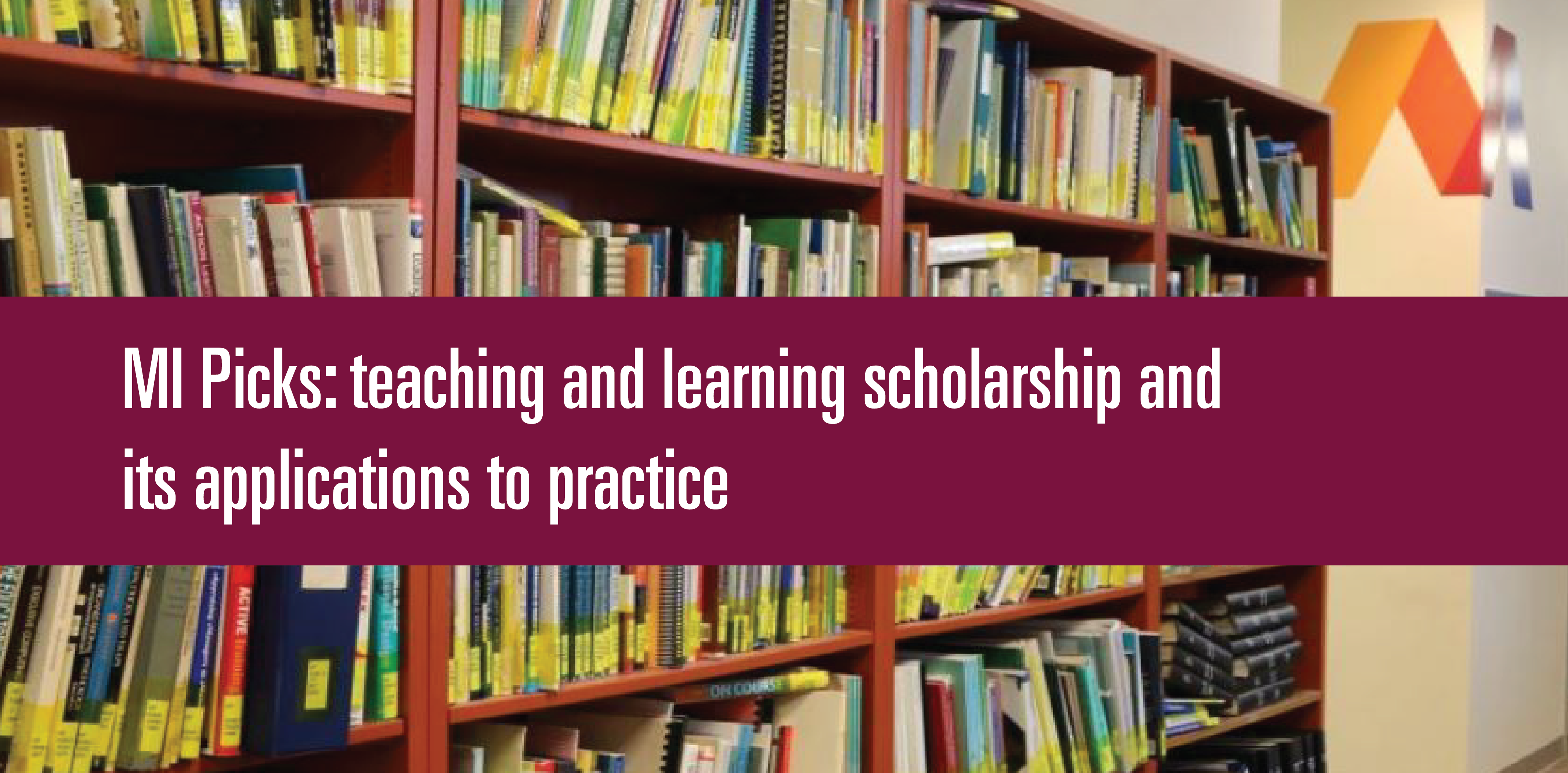MI Picks: Inclusive Excellence in Online Teaching and Learning

Summarized by: Alise de Bie, Elisa Do, Dani Pryke, Celeste Suart, and Vanessa Wong
MI Picks is a pilot initiative to engage the McMaster community with recently published teaching and learning scholarship and its applications to practice.
In alignment with McMaster’s commitment to building an inclusive community and fostering welcoming teaching and learning environments, the following five articles were chosen to introduce different approaches to theorizing, researching, and applying considerations of equity in online education. From identification of barriers to learning and teaching online for particular equity-seeking student and faculty groups, to critical pedagogical frameworks emphasizing the importance of relationships, these articles offer insights applicable to enhancing inclusive excellence in Winter 2021 courses and beyond.
Follow this link to a full 1–page summary for each article.
Beyond the Screen – How Women of Colour Navigate Online Teaching Spaces
Yao, C. W., & Boss, G. J. (2020). “A hard space to manage”: The experiences of women of color faculty teaching online. Journal of Women and Gender in Higher Education, 13(1), 1-15.
Highlight: Women of colour faculty who teach asynchronous online courses tend to carry their personal experiences, identities, and values into the online teaching space. This can be hard to navigate especially due to a lack of resources that address the challenges that women of colour faculty face. Higher education institutions should consider making the online space safer for women of colour and offer expansive faculty training beyond the use of technology (e.g., learning management systems). This training could include how to better engage students in an online environment.
Trading Quality of Life for Higher Education – Students with Learning Disabilities and Online Learning
Lambert, D. C., & Dryer, R. (2018). Quality of life of higher education students with learning disability studying online. International Journal of Disability, Development and Education, 65(4), 393-407.
Highlight: Although participation in higher education can bring students a sense of fulfillment, students with learning disabilities face unnecessary barriers that impact their quality of life. This includes an increase in stress and anxiety, lower self-esteem, restricted time for other activities, frustration in personal relationships and an increase in financial pressures. Such factors and their difficulties can be considered by educators in both online and in-person educational environments to better facilitate students’ academic success.
Five R’s for Indigenizing Online Learning
Tessaro, D., Restoule, J. P., Gaviria, P., Flessa, J., Lindeman, C., & Scully-Stewart, C. (2018). The Five R’s for Indigenizing online learning: A case study of the First Nations Schools’ Principals Course. Canadian Journal of Native Education, 40(1), 125-143.
This article describes the complexities of bringing Indigenous values into an online educational space and explores how the Five R’s of respect, relevance, reciprocity, responsibility, and relationships might mitigate these challenges.
What Would Paulo Freire Think of Avenue to Learn? Applying Critical Pedagogy to Online Learning
Boyd, D. (2016). What would Paulo Freire think of Blackboard: Critical pedagogy in an age of online learning. The International Journal of Critical Pedagogy,7(1), 164-186.
Highlight: Critical pedagogy is a movement that states that teaching and learning are entrenched with political and societal meaning. It encourages instructors and learners to challenge and think critically about the educational structures we find ourselves in. This paper focuses on how these principles can be applied in an online learning context.
Flexibility Today, Equity Tomorrow
Veletsianos, G., & Houlden, S. (2020). Radical flexibility and relationality as responses to education in times of crisis. Postdigital Science and Education, 2(3), 849-862.
Highlight: The changes caused by the COVID-19 pandemic have required flexibility, from both institutions and learners. Veletsianos and Houlden discuss this moment as an opportunity to examine university practices. They propose the original, theoretical idea of “radical flexibility” as a framework that could respond to future changes. Radical flexibility is rooted in building trusting relationships between faculty and learners. They conclude that radical flexibility is important because it can help address systemic education inequality and prepare institutions for future crises.
Scholarly Books on Critical Pedagogy and Online Teaching and Learning
Öztok, M. (2019). The hidden curriculum of online learning: Understanding social justice through critical pedagogy. Routledge. [e-book available through McMaster catalogue]
Stommel, J., Friend, C., & Morris, S. M. (Eds.). (2020). Critical digital pedagogy: A collection. Retrieved from https://cdpcollection.pressbooks.com.
McMaster Resources to Support Inclusive Excellence in Teaching
- McMaster’s Inclusive Teaching and Learning Guide
- Forward with FLEXibility: A Teaching and Learning Resource on Accessibility and Inclusion
- Professor Hippo-on-Campus Program
Summarized by: Alise de Bie, Elisa Do, Dani Pryke, Celeste Suart, and Vanessa Wong
MI Picks, Updates
